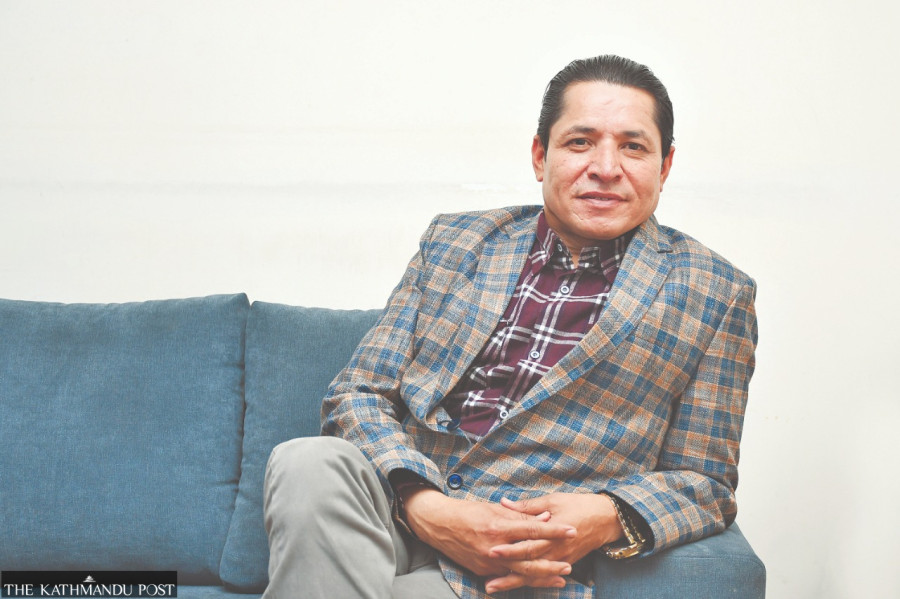Culture & Lifestyle
Nobody does Rishi Dhamala better than Rishi Dhamala
Whether you agree with his brand of journalism or not, Dhamala has known how to play the game long enough to be where he is today.
Pasang Dorjee
Nepali broadcast journalism has seen several renowned personalities such as Bhusan Dahal, Vijay Kumar Pandey, Bidhya Chapagain, Rabi Lamichhane and Dil Bhusan Pathak over the decades. What they each have brought to the table is common knowledge—but there is hardly anyone as conspicuous in the contemporary media landscape as this household name: Rishi Dhamala.
The majority of us may have come to recognise him through his often controversial and unconventional show 'Dhamala ko Hamala', or the nighttime political talk show 'Janata Janna Chahanchhan', as he is universally known for shooting blunt remarks at his guests and assuming a consistently fiery demeanour on the shows.
“I used to think to myself: How would the public take an interest in me? Why would they even want to listen to what I have to say? What is it that I can offer to my audience that would separate my shows from the rest of the Nepali media scene? That is where the character ‘Rishi Dhamala’ enters to fill that particular gap—to answer those very questions,” says Dhamala, in an explosive fashion. Whether the public is fond of him or not, it wouldn’t be amiss to say that Dhamala indeed has changed the way we collectively perceive and consume Nepali broadcast journalism in contemporary history.
Born on November 12, 1970, in Dhading district's Jyamrung village, Dhamala reminisces about his childhood with a warm expression. His forehead glistens and his cheeks stretch out to form a wide grin, as the fluorescent lights in the room further accentuate his bright complexion. There is a certain spark on his face as he recalls 13-year-old Durga Raj—the name by which Dhamala was called in his village. “I was a tenacious boy—rebellious, restless, and always in search of some kind of thrill to keep me busy. I knew that the place I grew up in was too small for my ambitions. While studying at the local village school, Sankhadevi, I made a resolve to myself that I would leave the village at any cost,” says Dhamala, rocking back and forth on the couch. You can sense the enthusiasm bred by nostalgia in his dramatic tone while addressing each question, but he subsequently attempts to gain composure to answer articulately and not get carried away.
“I was 14 when I ran from home and came to Kathmandu on foot. My father had no clue as to what I was up to, and nor did he know that I would be staying at my maternal uncle’s place at Kaldhara while in Kathmandu”, says Dhamala. After losing his mother at a young age of eight, he was left with three siblings, and his father was particularly attached to Dhamala, mainly because he was the youngest son.
His primary intention in coming to Kathmandu was to study Sanskrit, he says. “Being proficient in Sanskrit at that time meant that you could have that desired edge in any professional or academic setting. I managed to enrol in a Sanskrit school with the help of my uncle. Unfortunately, that was a short-lived experience, as my father soon found out that I was staying at my uncle’s and instantly came to fetch me”. Not long after, Dhamala says, his father allowed him to travel back to Kathmandu to live with his uncle and pursue Sanskrit, on the condition that he complete Grade 7 from his local school first.
While talking about his foray into journalism, Dhamala recalls the days of the '90s democratic movement when his brother-in-law was already spearheading some local newspapers in the city during that period. Entering the media field, he says, was merely circumstantial, as he needed a job to sustain himself while studying Sanskrit at the capital. “No one persuaded me into joining this field. At fifteen years old, I was enrolled in a Sanskrit school while concurrently being tasked with selling newspapers door-to-door, dropping newspapers at local newsstands, and shops. As a teenager, it wasn't easy for me to convince people to buy newspapers, and having to knock on doors trying to get them to read the papers, especially during such a tumultuous period as the democratic movement of the '90s”, he says.
His voice grows a bit sombre while recollecting his past. After his stint selling papers, he started looking for jobs at local news outlets as a writer and hopped from one job to the next, honing his craft and steadily building a reputation for himself. “Professionally speaking, I dove into the weekly newspaper business because dailies were not as prominent back then. I worked at 'Naya Pushta', 'Drishti', 'Ghatana ra Bichaar', 'Prakash', 'Punarjagaran', and a dozen other major weekly outlets. I later transitioned into the radio and television field, covering current affairs," says Dhamala. One can immediately sense the fervour with which he converses, especially when he talks about his line of work.
Currently the founder and chairperson of Prime Times Television, Dhamala is commonly known for adhering to a rigorous routine from dawn to dusk, often working an 18-hour schedule. For someone from the outside looking in, Dhamala’s commitment to his vocation is a thing of wonder and awe, he claims. “People often ask me where this energy comes from, and how I am able to consistently look the same without a hint of being worn out and tired.”
Whether it’s for personal glory or for the pursuit of top-notch journalism, one can’t dismiss the fact that Dhamala is an unrelenting and fiercely ambitious individual. He shares a few anecdotes highlighting how some of the well known Nepali political figures like Madhav Kumar Nepal, Prachanda, and Girija Prasad Koirala acknowledged Dhamala’s tenacity of spirit for his profession. “I was annoyingly persistent when it came to bringing key politicians to my shows”, says Dhamala. “Once, I waited three hours in the rain to get an audience with Madhav Kumar Nepal, the former Prime Minister, outside of his house. He was attending a meeting around midnight, while I waited until 2 am in the morning to conduct an interview with him. Upon discovering that I was at his house, the minister was completely taken aback at first but he eventually gave in to my insistence and sat down for an interview at 2:30 am."
Dhamala’s unyielding nature in his 28 years of being in the business has, nonetheless, come at the cost of his personal life. Father of two, and husband to actress Aliza Gautam, he says that he struggles to devote adequate time to his close ones. “I don’t have much qualms about anything in life except for the fact that I haven’t been able to spend as much time with my family. Even as a young and emerging journalist back in the day, I was so preoccupied with work that my father would often complain about me not marrying on time. That was his biggest reservation, that I wasn’t married, not even until his demise," says Dhamala. His expression often feels like a pendulum swinging between some histrionics but also genuine remorse.
Snippets of guests squabbling on Dhamala’s shows often circulate on the internet and end up becoming a meme. Dhamala’s own public persona tends to become a subject of mockery and ridicule. He has often been called out for asking extremely invasive personal questions, especially to his shows’ female guests—a trope commonly followed by male tv hosts in entertainment journalism. When asked whether he feels a sense of regret after the cameras are off, his answers feel a bit convoluted. “I don’t hold back on my punches when questioning my guests. But I do sometimes feel like perhaps I was a bit too brash, especially when the guests are well-meaning and earnest individuals.”
While making headway into the mainstream for being unnecessarily forthcoming on his show ‘Dhamala ko Hamala’, he does acknowledge the kind of image he is portraying to draw people towards him. When asked to what extent his on-camera personality is concocted, Dhamala says that he deliberately magnifies that specific image, “People are often caught off-guard when they meet the toned-down version of Rishi Dhamala in real life. While the dramatised manner in which I speak on camera sometimes pervades real-life conversations, I definitely make an attempt not to let it affect my personal life.”
While we, as viewers, derive that entertainment aspect from his shows, and one may not be inclined to take Dhamala seriously—especially considering how he is currently running a political talk show ‘Janata Janna Chahanchhan’—it is still worth noting that virtually every face in contemporary politics appears on his platform. Dhamala knows what he is doing, and whether we dislike him or think that he is not a 'real' journalist, he still garners a commendable level of viewership, thanks to the same identity that people either despise or feel entertained by.
Running the Reporters Club of Nepal, a Nepali journalists association, Dhamala expresses his optimism towards the future of journalism, especially due to the advent of technology. “If you are verbally adept, resourceful, persistent, and have information at your disposal, you can survive in this field," he says. “And with the kind of innovative devices at our disposal, I cannot wait to see where the next generation of journalists are headed."
Whether you agree with his brand of journalism or not, Dhamala has known how to play the game long enough to be where he is today. “At this point in my career, I am not too concerned about what my guests make of me and nor do I feel threatened by any political force. I am, however, gradually becoming more conscious of the public’s perception of me. This is something that I have to accept because at the end of the day, I am where I am due to my readers, viewers, and well-wishers," says Dhamala. Learning to differentiate between invalid and valid remarks of his audience and internalise the valid remarks for his own growth is something that Dhamala feels is paramount in thriving in the business.
“To what extent do I let the public's opinion of me mould my image is certainly up to me. I cannot afford to be blatantly dismissive of what my audience thinks of me, but at the same time, I need to maintain my own image—the one that the public ultimately craves and comes back for”, he says, letting out yet another wide grin. “Because Rishi Dhamala is Rishi Dhamala. That extra element has always been there, and is definitely here to stay."




 22.65°C Kathmandu
22.65°C Kathmandu















